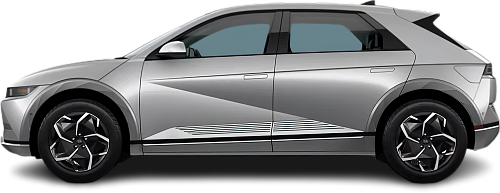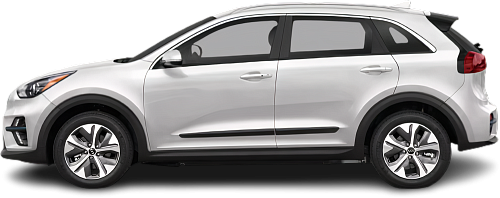USA EV Comparison: Hyundai Ioniq 5 Project 45 vs Kia Niro EV Standard Range
Struggling to Decide? Let AI Help!
Your AI Summary Is Ready!
General Info
Both vehicles have been discontinued and were never available for sale in the United States.
The two vehicles share the same body style: SUV.
| Property | Hyundai Ioniq 5 Project 45 | Kia Niro EV Standard Range |
|---|---|---|
| Years of Production | 2021-2021 | 2019-2022 |
| Current Status | Discontinued | Discontinued |
| Country of Manufacture | Indonesia, Singapore, South Korea | South Korea |
| Body Style | SUV | SUV |
| Market Availability | EU | EU |
| GCC Score | 6.8 | 5.2 |
Range and Efficiency
While the Hyundai Ioniq 5 Project 45 (2021) offers a longer real-world range and a bigger battery, it is less energy-efficient than the Kia Niro EV Standard Range (2019-2022).
| Property | Hyundai Ioniq 5 Project 45 | Kia Niro EV Standard Range |
|---|---|---|
| Range (WLTP) | 267 mi | 180 mi |
| Range (GCC) | 227 mi | 153 mi |
| Battery Capacity (Nominal) | 72.6 kWh | 42 kWh |
| Battery Capacity (Usable) | 70 kWh | 39.2 kWh |
| Efficiency per 100 mi | 30.8 kWh/100 mi | 25.6 kWh/100 mi |
| Efficiency per kWh | 3.24 mi/kWh | 3.9 mi/kWh |
| Range and Efficiency Score | 6.1 | 5.9 |
Charging
The Hyundai Ioniq 5 Project 45 (2021) features an advanced 800-volt architecture, whereas the Kia Niro EV Standard Range (2019-2022) relies on a standard 400-volt system.
The Hyundai Ioniq 5 Project 45 (2021) offers faster charging speeds at DC stations, reaching up to 221 kW, while the Kia Niro EV Standard Range (2019-2022) maxes out at 44 kW.
The Hyundai Ioniq 5 Project 45 (2021) features a more powerful on-board charger, supporting a maximum AC charging power of 10.9 kW, whereas the Kia Niro EV Standard Range (2019-2022) is limited to 7.2 kW.
| Property | Hyundai Ioniq 5 Project 45 | Kia Niro EV Standard Range |
|---|---|---|
| Max Charging Power (AC) | 10.9 kW | 7.2 kW |
| Max Charging Power (DC) | 221 kW | 44 kW |
| Architecture | 800 V | 400 V |
| Charge Port | CCS Type 2 | CCS Type 2 |
| Charging Score | 7.6 | 4 |
Performance
The Kia Niro EV Standard Range (2019-2022) is front-wheel drive, while the Hyundai Ioniq 5 Project 45 (2021) offers an all-wheel drive system.
The Hyundai Ioniq 5 Project 45 (2021) boasts greater motor power and accelerates faster from 0 to 60 mph.
| Property | Hyundai Ioniq 5 Project 45 | Kia Niro EV Standard Range |
|---|---|---|
| Drive Type | AWD | FWD |
| Motor Type | PMSM (front), PMSM (rear) | PMSM |
| Motor Power (kW) | 225 kW | 100 kW |
| Motor Power (hp) | 302 hp | 134 hp |
| Motor Torque | 446 lb-ft | 291 lb-ft |
| 0-60 mph | 5 s | 9.5 s |
| Top Speed | 115 mph | 96 mph |
| Performance Score | 5.2 | 3 |
Dimensions
The Hyundai Ioniq 5 Project 45 (2021) is longer, wider, and taller.
The Hyundai Ioniq 5 Project 45 (2021) boasts a more extended wheelbase.
| Property | Hyundai Ioniq 5 Project 45 | Kia Niro EV Standard Range |
|---|---|---|
| Length | 182.5 in | 172.2 in |
| Width (with Mirrors) | 84.7 in | - Width (with Mirrors) |
| Width (w/o Mirrors) | 74.4 in | 71.1 in |
| Height | 63.2 in | 61.4 in |
| Wheelbase | 118.1 in | 106.3 in |
Cargo and Towing
The Hyundai Ioniq 5 Project 45 (2021) provides more cargo capacity, featuring both a larger trunk and more space with the rear seats folded.
A frunk (front trunk) is available in the Hyundai Ioniq 5 Project 45 (2021), but the Kia Niro EV Standard Range (2019-2022) doesn’t have one.
The Hyundai Ioniq 5 Project 45 (2021) has a towing capacity of up to 3527 lb, whereas the Kia Niro EV Standard Range (2019-2022) is not officially rated for towing in the US.
| Property | Hyundai Ioniq 5 Project 45 | Kia Niro EV Standard Range |
|---|---|---|
| Number of Seats | 5 | 5 |
| Curb Weight | 4619 lb | 3629 lb |
| Cargo Volume (Trunk) | 26.3 ft3 | 18.5 ft3 |
| Cargo Volume (Max) | 58.5 ft3 | 53 ft3 |
| Cargo Volume (Frunk) | 0.8 ft3 | - Cargo Volume (Frunk) |
| Towing Capacity | 3527 lb | - Towing Capacity |
| Cargo and Towing Score | 7 | 5.5 |




